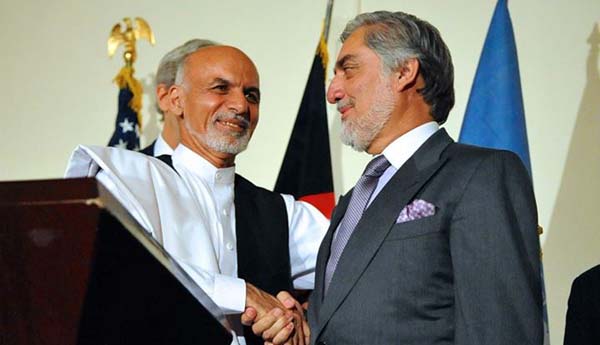The lengthened electoral deadlock, subsequent to unaddressed claims of industrial scale fraud by Dr. Abdullah earned an international concentration. The world leaders, including president Obama had previously, urged the two candidates, extend support to the continuation of the democratic process. However, the harmonious finalization of the disputed electoral process rests to compilation of fair and transparent results, or adopts a clear deal making course drawing equal and mutual agreement of both candidates. Nevertheless, the conduct of election commission producing enormous discrepancies and result manipulation can never be justified.
The poor result formulation undertaken by the commission depicted that most of Afghans institutions are poorly governed and administered due to corrupt practices and misuse of power or authority. The thirteen years long centralized presidential democracy didn’t concentrate on institution building, instead the presidential palace offered a political solution to every minor or major problem, materialized the problems witnessed presently.
The country could head to political turmoil if the international co-ordination and co-operations were not sought. The series of demonstration held by Dr. Abdullah’s camp succeeded earning the concentration of US, EU and UN towards this very burning issue of electoral irregularities. Observing lots of irregularities, the report of European Union Election Assessment Team (EU EAT) agreed, the need for an all-inclusive audit of polling stations that affected one-third of the polling sites and 4.2 million votes. The high number of discrepancies is a "worrying proportion", stresses the EU EAT.
Following the demand of comprehensive vote audit the UNAAMA has come forth with a more exclusive way out strengthening the credibility of result assemblage of the runoff. Consequently, UNAMA proposed for an additional audit aimed at strengthening the credibility of the country’s electoral process and acceptance of the results from the recent presidential election run-off by both campaigns and Afghans.
Based on extensive consultation with the two campaigns, the following set of audit criteria is contained in the proposal put forth by the UN for 8,050 polling stations (35 % polling stations) and 3.5 million ballots (44 percent ballots cast): All polling stations with 595+ votes (including repeating the audit of 599+ votes already conducted by the IEC).
All female polling stations that were staffed by male workers.
1- All polling centers where, although the number of female polling stations was less than or equal to that of male polling stations, the votes from female polling stations exceeded votes from male polling stations.
2- All polling stations where votes received by either candidate is a multiple of fifty, starting from 100 votes.
Devoid of all concerns and formulated strategies, it is noteworthy to put an end to electoral crisis, by keeping the workability then specialty of proposed strategies, in consideration. Any strategy succeeding to secure the confidence of the two campaigns and Afghans whilst being able to drag the country out of lengthened impasse, which is invalidation of fraud votes, might work.
The issue of fraud votes wasn’t comprehensively addressed yet; in the meanwhile, the Independent Election Commission of Afghanistan (IEC) announced the preliminary result of the presidential runoff election that read Ghani lead with a distinct margin of one million votes, adding fuel to spark of electoral controversy. The declaration of the result came forth amidst loud uproar of huge scale fraud charges raised by his political rival Dr. Abdulah. On July 8, Abdullah told a rally of his supporters that he was the victor and should be inaugurated as Afghanistan's next president. The political scenario clearly manifested the upcoming political crisis.
It’s, therefore, a smooth transition of power in Afghanistan appears highly problematic unless some sort of deal is worked out between Ghani and Abdullah before July 22. Formerly, Secretary of State John Kerry paid a visit to Kabul, met the two presidential runner, subsequently brokered deal to ease the Afghan election crisis with a comprehensive audit of the vote was quietly agreed on an even more profound reshaping of the entire government system, with simultaneous molding presidential to parliamentary democracy owing an empowered prime minister.
The credible media sources revealed that the deal is fixed between Ghani and Abdullah at this point that might turn out to be the right approach; yet it still remains an unlawful method of transfer of power, given the parliamentary system pleads constitutional amendments. It is always easy said than done, the deal making phenomenon is not easy to implement, notwithstanding there are multiple complications on the way to deal making process.
According to reliable sources the deal made entails; the candidate who is declared president after a complete vote audit in the coming weeks would then appoint either the loser, or that candidate’s nominee, to become a “chief executive” for the government, with power distribution as to be agreed on later. Undoubtedly, it would give rise to a blend system owing the taste of both parliamentary and presidential systems until the constitution is not amended. Following the onset of the deal, the Constitution would be amended to create a parliamentary democracy with a prime minister as head of government and a president as the head of state. It is said that both Mr. Abdullah and Mr. Ghani pledged to accept the results and form an all-encompassing unity government following the assurance of the deal with Mr. Kerry.
Seeing the complications of lengthened deadlock the deal was necessitated to avert the system heading to political turmoil, nonetheless, the credibility of the electoral result still counts enormously. One may not deliberately, give the deal a winning status, as long as an inclusive government is not seen successfully operating on the ground, still reliant on clearer power sharing formula. It is feared if this or identical formula fails to deliver the desired outcome, the prolonged political crisis waits the fate of Afghanistan will substantiate the potential threat to harmonious co-existence of Afghanistan.

